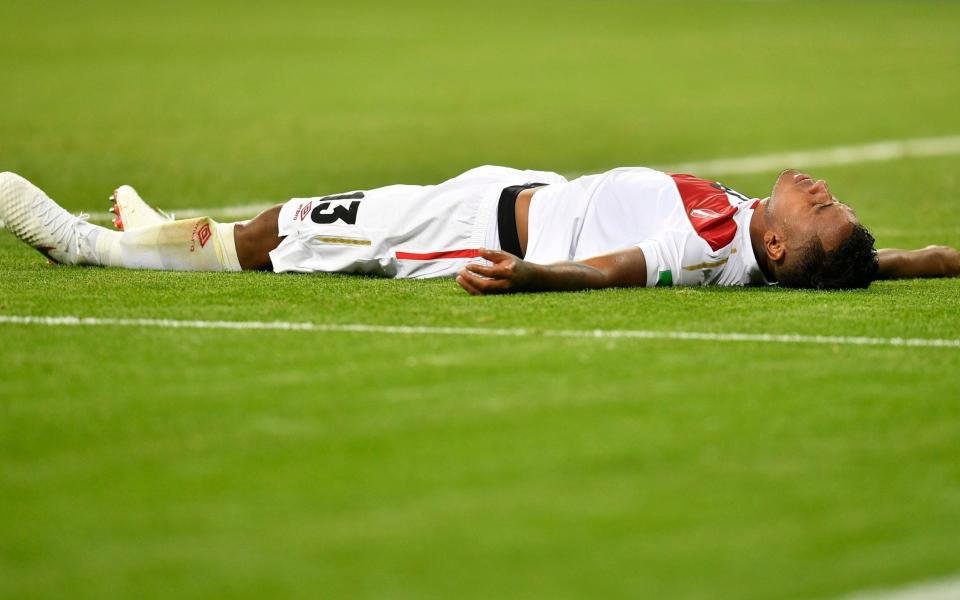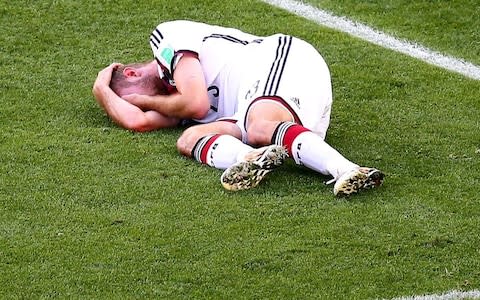Why won't football follow other sports and introduce concussion subs?

Speak to Taylor Twellman and you will receive a fairly blunt assessment of the various concussion protocols that have been introduced in football. “Eye candy,” says Twellman, whose professional career was prematurely ended by a serious head injury.
Speak to Fifa, Uefa or the Football Association and they will insist that player welfare is their top priority and tell you all about some of the changes that have been introduced.
These two contrasting characterisations have been tested in the weeks that have followed Liverpool’s Champions League defeat, culminating in a Daily Telegraph interview last Friday with Michel D’Hooghe, the chairman of Fifa’s medical committee that will have alarmed campaigners and only reinforced Twellman’s scepticism.
The wider context was the calls from medical experts, as also revealed by The Telegraph, for a comprehensive overhaul of the guidelines surrounding suspected concussions.
This protocol has also already been brought into sharp focus during the World Cup following a worrying incident when Peru’s Renato Tapia was knocked flat to the ground against Denmark and yet allowed to continue after only a brief check before being substituted 13 minutes later. As it stands, a referee has the power to stop a match for three minutes to allow a team doctor to complete an on-pitch assessment for suspected concussion. The referee will then only allow the injured player to continue with the authorisation of the team doctor.

But there is a rather obvious problem here. Signs and symptoms of a concussion do not adhere to an arbitrary three-minute window. They can take hours, or even days, to emerge and certainly longer than 180 seconds.
Decisions, then, often come down to educated guesswork. And this educated guesswork rests with a medic who knows that his decision whether to remove a player is both binding on the game and likely to harm his employer’s team, especially if all three substitutes have been used. You can only imagine the pressures.
It can never be a perfect science but there is a quite obviously preferable alternative. They are concussion substitutes, variations of which are used in other sports, including rugby union and American football. In rugby, for example, an independent doctor has video access to identify head blows. Any signs of a concussion mean an automatic end to the player’s match. Even if there are no immediate signs of concussion, a player is removed for a 10-minute off-field assessment that will include screening tools and video replays, during which they can be replaced.
As also reported by The Telegraph, Premier League doctors are now privately calling for this but, even in acknowledging that three minutes “is not enough for a complete neurological examination”, D’Hooghe has ruled it out. So, why is football different?
Are the doctors somehow quicker at assessing concussion? Are they just more independent? Of course not. No medical argument was advanced, just a suggestion that teams would use any new rule as a means to effectively cheat. “I hope you don’t believe that this would be used rightly every time,” said D’Hooghe.
More concerning #WorldCup2018#concussion care today!
Peru's Renato Tapia is not moving when the referee arrives after a severe body-to-head impact, yet is not evaluated, & returns. When he finally stands up, FS1 commentator says, "It looks like he's fine." Watch the video: pic.twitter.com/ix8fX64ISQ— Chris Nowinski, Ph.D. (@ChrisNowinski1) June 16, 2018
At one level, he is probably right. You have only to watch the way throw-ins, free-kicks and corners are contested to know that football’s culture permits the ruthless and often cynical exploitation of every conceivable advantage. A recent conversation with one Premier League doctor certainly confirmed that. “If a team needed a goal and had used all their substitutions, I could well imagine that there are certain managers who would encourage a defender to go down with a head injury and then want to bring on a striker,” he said.
But the doctor also added a crucial caveat. “Even if that danger exists, is the image of the game more important than player health? And should we not then just be thinking about ways this could not be abused?”
It would not be so difficult. Lengthy bans for misuse would be one obvious necessity. Placing decisions in the hands of somebody medically independent could be another.
In one sense, Fifa actually indirectly makes this exact argument in its refusal to support temporary substitutions. For if it is so unable to trust unscrupulous teams not to manipulate the situation for sporting advantage, why do they now also leave those same medical decisions in their hands?
World Cup 2018 | The best of the Telegraph's coverage
It is a situation that feeds into a wider concern over whether the existing concussion protocols are being vigorously upheld. Aside from the Tapia incident, research by a team of doctors into the 2014 World Cup found that, after almost two-thirds of head collisions in the tournament, there was no assessment by a healthcare personnel. The memory of Germany midfielder Christoph Kramer playing on for 14 minutes after a heavy blow to the head in the final remains shocking.
Dr Willie Stewart was the neuropathologist who diagnosed chronic traumatic encephalopathy in Jeff Astle, the former England striker, and having now begun FA-funded research into the prevalence of neurological disease among former players, is damning of the current situation.
“Football is operating in the last century in terms of brain injury management, when the rest of sport has moved on,” he says. “The way the medics are left to deal with this, they are handcuffed. Football doesn’t allow an interchange for a player to be assessed to see if he has a brain injury; doesn’t allow significant time for the medics. It’s unacceptable in 2018 that it should be this way.”
That common-sense change will eventually arrive is surely inevitable. The great worry is that the catalyst for action will be an incident far more serious than a goalkeeper potentially costing his team the Champions League.

